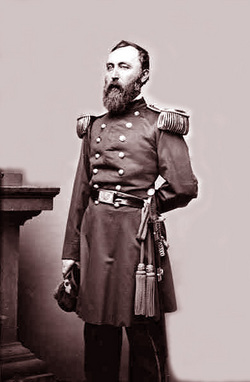
U.S. Commissioner Jacob Bowman Sweitzer later served in the 62nd Pennsylvania Volunteer Infantry (Find A Grave)
Jacob Bowman Sweitzer (1821-1888)
OFFICE LOCATION: Pittsburgh, PA
TENURE: 11/1850 –
HEARINGS: 2
RENDITIONS: 1
CASES:
Woodson (or Gardner) Case (1851) – 1 returned
- The first case to come before Commissioner Sweitzer unfolded in March 1851, when two agents representing Kentucky slaveholder Rhoda B. Byers arrived in pursuit of an alleged runaway slave named Woodson. The two men, Benjamin Rust and William Reed, headed straight for Sweitzer’s office, where the commissioner complied with their request for a warrant of arrest. [1851-03-22 Pittsburgh Saturday Morning Visiter; 1851-03-29 Pittsburgh Saturday Morning Visiter]
Calvin Jones Case (1853) – 1 released
- Memphis claimants John C. and William F. Farrington, executors of the estate of Jacob F. Farrington, journeyed to Pittsburgh in pursuit of alleged freedom seeker Calvin Jones, also known as Lunor Lon. Multiple Pittsburgh African Americans “were brought forward and testified that they had known Calvin Jones (so called) since the great fire in Pittsburgh” in 1845. The Memphis Appeal seethed that “upon this rebutting testimony of free negroes, the prisoner was discharged.” [1853-06-16 Huntsville, AL Democrat]
NOTES:
Sweitzer was appointed as commissioner in November 1850, by Supreme Court Justice Robert C. Grier.
- Sweitzer’s appointment came in the wake of “threats and denunciations” towards prospective appointees, according to Justice Grier. [1850-11-21 Pittsburgh Daily Post; 1850-11-30 Washington, D.C. National Intelligencer]
- In a piece describing the operations of the Underground Railroad near Pittsburgh, Jane Grey Swisshelm’s anti-slavery Saturday Morning Visiter taunted: “We were not little apprehensive lest Commissioner Sweitzer and his patriotic allies might be on the lookout. But our county kennel appears not to have been in hunting order, for we did not hear a single bay on the track of this rich game, and this valuable property which the law has made property….” [1852-01-31 Pittsburgh Saturday Morning Visiter]